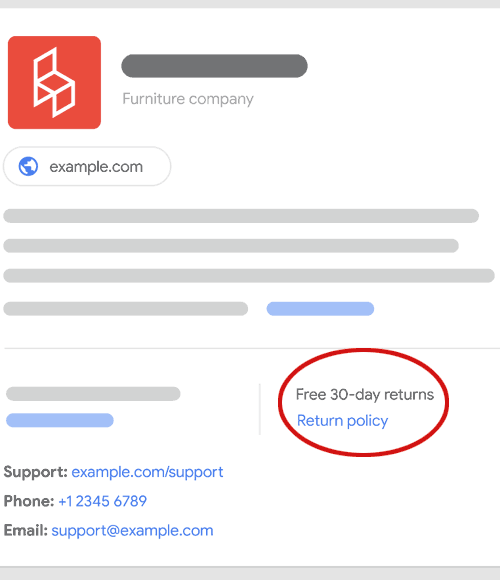

Last updated on

Google has recently revised its structured data guidelines to accommodate a sitewide return policy within the Organization structured data. This update streamlines the process by eliminating the necessity to include redundant return policy details for each product listing structured data. The implementation of this change has the potential to enhance traffic and sales for online merchants.
It’s important to note that this update doesn’t mandate merchants to modify their existing structured data. The previous method remains unchanged. Rather, it introduces an alternative approach that is more efficient, reducing the size of product structured data.
The modification to Google’s organization structured data will be evident in the brand panel displayed when users search for a particular brand name. This updated brand panel will incorporate a fresh entry highlighting the company’s return policy.

In this update, Google is enhancing its search features within Knowledge Panels and Brand Panels to include a merchant’s return policies. This addition allows a merchant’s search feature to display return policies, potentially boosting clickthrough rates from the search engine results pages (SERPs) and increasing conversion rates.
According to research conducted by the International Council of Shopping Centers (ICSC) in 2024, online shoppers are significantly swayed by a merchant’s return policy. The findings reveal that:
It’s evident that a well-defined return policy can serve as a catalyst for increased online sales, and Google’s recent support for sitewide returns policy structured data aims to streamline the communication of this vital information directly to online shoppers from search results.
In their announcement, Google elucidated:
“A return policy holds significant weight in the minds of shoppers when making online purchases. Last year, we introduced the extraction of structured data for return policies on individual products. Today, we’re extending this support to include return policies at the organization level. This means you can now specify a comprehensive return policy for your business, eliminating the need to define one for each individual product.
Incorporating a return policy into your organization’s structured data is particularly crucial if you don’t have a Merchant Center account but still want to provide a return policy for your business. For those with a Merchant Center account, we recommend defining your return policy there instead.
If your website represents an online or local business, we recommend utilizing one of the OnlineStore or LocalBusiness subtypes of Organization.
We believe this addition will simplify the process of implementing return policies for your business and facilitate their visibility across Google shopping experiences.”
Google has introduced a fresh segment to their Organization structured data guidelines, outlining support for a novel approach to displaying return policies in search results.
The updated documentation reads:
“MerchantReturnPolicy
Employ the subsequent properties to articulate comprehensive return policies for your entire Organization, if they are relevant to your business. In case you have distinct policies for individual products, opt for merchant listing markup instead.”
Original news from SearchEngineJournal